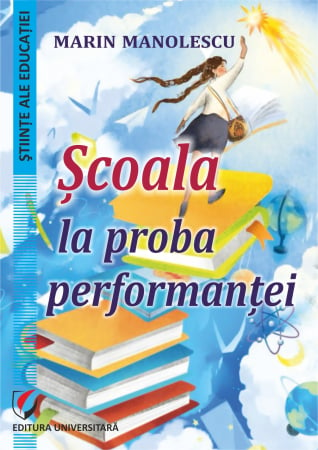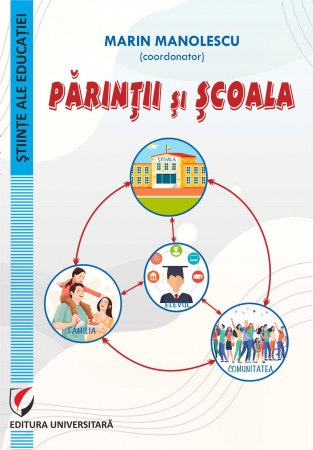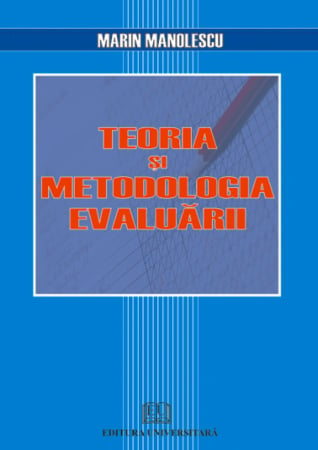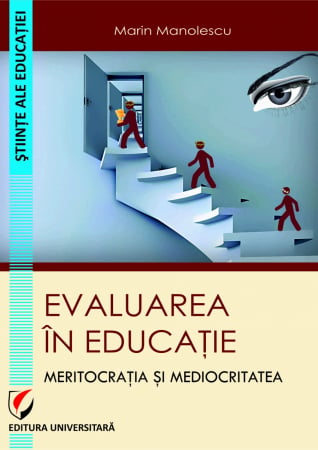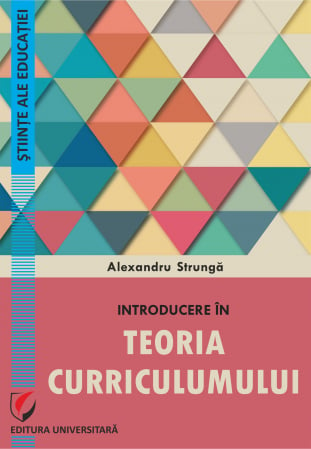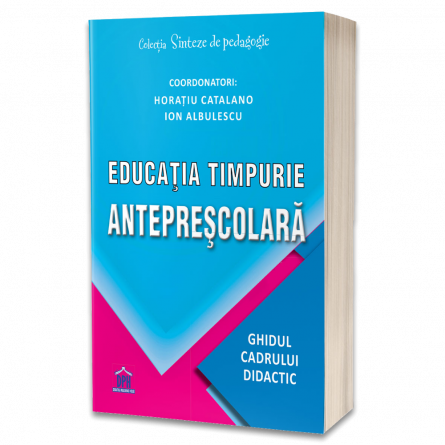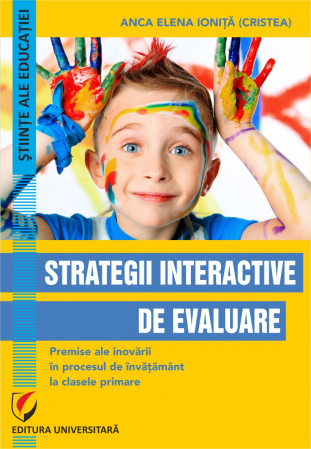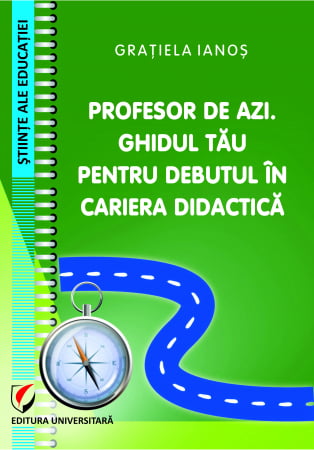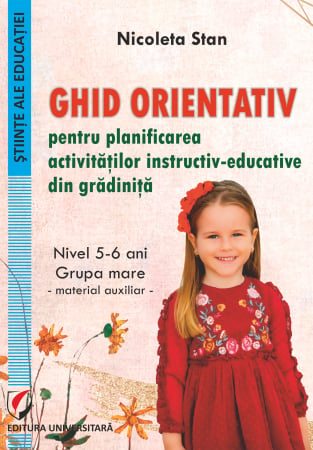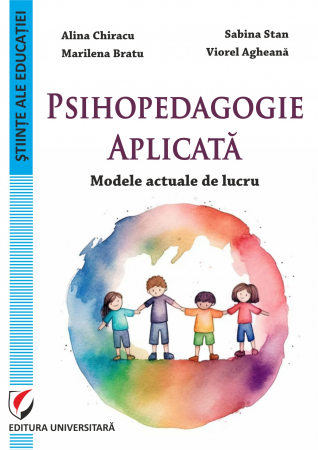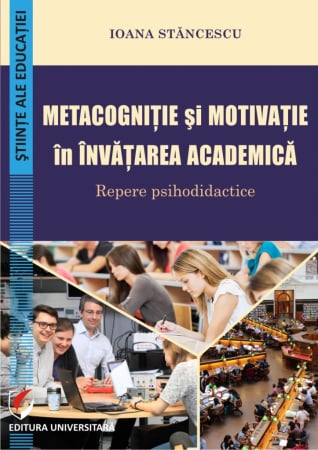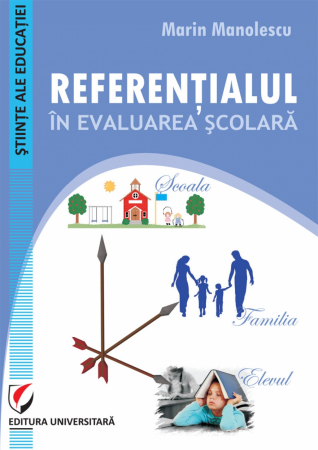Manuscript proposals: [email protected] / 0745 204 115 //// Tracking orders Individuals / Sales: 0745 200 357 / Orders Legal entities: 0721 722 783
6359.png) Educational connections beyond content. An applied perspective for teachers. Volume I - Cristina Tripon, Ana-Voichita Tebeanu, Iulia Gonta, Aurelia Bulgac
Educational connections beyond content. An applied perspective for teachers. Volume I - Cristina Tripon, Ana-Voichita Tebeanu, Iulia Gonta, Aurelia Bulgac
6359.png)
Publisher: Editura Universitară
Author: Cristina Tripon, Ana-Voichita Tebeanu, Iulia Gonta, Aurelia Bulgac
Edition: I
Pages: 158
Publisher year: 2023
ISBN: 978-606-28-1652-0
DOI: https://doi.org/10.5682/9786062816520
Product Code:
9786062816520
Do you need help?
0745 200 357
- Description
- Download (1)
- Authors
- Content
- More details
- Reviews (0)
In a constantly changing world, where information is at their fingertips and technology advances rapidly, effective teaching and creating an optimal climate in the classroom become essential priorities for educators. The book explores innovative ways to motivate students, to create a pleasant learning climate and to strengthen the connection between school and family. This work aims to offer practical ideas and effective solutions to improve the educational experience of students and to promote a high degree of originality in the learning process.
The book highlights the importance of effective teaching, emphasizing the fact that the role of the teacher is not limited to the transmission of knowledge, but also involves the creation of an authentic connection with the students. The authors urge us to get to know our students in depth, to understand their individual needs and to adapt teaching strategies according to their diversity. Through concrete examples and case studies, the book emphasizes the importance of implementing innovative and interactive methods, which stimulate students' critical and creative thinking.
The book highlights the importance of effective teaching, emphasizing the fact that the role of the teacher is not limited to the transmission of knowledge, but also involves the creation of an authentic connection with the students. The authors urge us to get to know our students in depth, to understand their individual needs and to adapt teaching strategies according to their diversity. Through concrete examples and case studies, the book emphasizes the importance of implementing innovative and interactive methods, which stimulate students' critical and creative thinking.
-
Educational connections beyond content. An applied perspective for teachers. Volume I
Download
CRISTINA TRIPON
ANA-VOICHITA TEBEANU
IULIA GONTA
AURELIA BULGAC
ANA-VOICHITA TEBEANU
IULIA GONTA
AURELIA BULGAC
Argument / 7
Principles of effective teaching / 11
Summary / 12
Objectives / 12
Framing learning around anchor ideas / 15
Curriculum design based on concepts / 16
Helping students to become interested in learning / 16
What does the research say? / 17
The effort of the students compensates the abilities / 18
Students show less curiosity and involvement the longer they stay at school / 18
Internal rewards are stronger motivating factors for deep learning than external rewards / 19
Curiosity prepares the brain for learning and supports learning retention / 20
Cognitively challenging learning increases students' interest / 25
Strategies for stimulating cognitive interest / 26
The gradual release of responsibility: A structure to support learning / 32
Focused training / 34
Guided training / 34
Collaborative learning / 35
Independent learning / 36
Structures that do not support learning / 38
The attention paid to the social and emotional dimensions of learning / 41
Participation in the social and emotional dimensions of learning / 41
Factor X in the success of training: Credibility of the teacher / 44
Class climate / 49
Summary / 49
Objectives / 50
Introduction / 50
Establishing positive relationships with students / 50
Strategies for building caring relationships / 51
Strategies to build strong relationships systematically / 56
Using effective communication skills / 70
Building a community of students / 79
What is it like to be motivated? How to motivate others? / 84
Summary / 84
Objectives / 84
Introduction / 85
Motivation as a process / 88
Where is the motivation located? / 89
Moderating factors of the motivational state / 90
How to motivate others? / 93
How can motivation be evaluated? / 114
Practical exercises to motivate teenagers / 116
Building relationships between teachers, students and their families / 118
Summary / 118
Objectives / 118
Open and efficient communication / 120
Mutual understanding and respect / 122
Collaboration and active involvement / 123
Formation of the environment of trust and mutual support / 124
Acknowledging success and encouraging student progress / 126
Quality parent-teacher relationships / 128
Analysis of relationships from the perspective of Bronfenbrenner's bioecological theory / 129
The influence of the student's cultural factor on the parent-teacher relationship / 131
The role of the school psychologist in promoting positive parent-teacher relationships / 133
Promoting collaboration between school and family / 137
The personality of the teacher as a factor in the formation of the future / 140
The influence of the teacher's personality on the students' training / 140
Flexibility - a necessary attribute for the teacher's (self-)actualization and (self-)realization / 145
Bibliography / 147
Principles of effective teaching / 11
Summary / 12
Objectives / 12
Framing learning around anchor ideas / 15
Curriculum design based on concepts / 16
Helping students to become interested in learning / 16
What does the research say? / 17
The effort of the students compensates the abilities / 18
Students show less curiosity and involvement the longer they stay at school / 18
Internal rewards are stronger motivating factors for deep learning than external rewards / 19
Curiosity prepares the brain for learning and supports learning retention / 20
Cognitively challenging learning increases students' interest / 25
Strategies for stimulating cognitive interest / 26
The gradual release of responsibility: A structure to support learning / 32
Focused training / 34
Guided training / 34
Collaborative learning / 35
Independent learning / 36
Structures that do not support learning / 38
The attention paid to the social and emotional dimensions of learning / 41
Participation in the social and emotional dimensions of learning / 41
Factor X in the success of training: Credibility of the teacher / 44
Class climate / 49
Summary / 49
Objectives / 50
Introduction / 50
Establishing positive relationships with students / 50
Strategies for building caring relationships / 51
Strategies to build strong relationships systematically / 56
Using effective communication skills / 70
Building a community of students / 79
What is it like to be motivated? How to motivate others? / 84
Summary / 84
Objectives / 84
Introduction / 85
Motivation as a process / 88
Where is the motivation located? / 89
Moderating factors of the motivational state / 90
How to motivate others? / 93
How can motivation be evaluated? / 114
Practical exercises to motivate teenagers / 116
Building relationships between teachers, students and their families / 118
Summary / 118
Objectives / 118
Open and efficient communication / 120
Mutual understanding and respect / 122
Collaboration and active involvement / 123
Formation of the environment of trust and mutual support / 124
Acknowledging success and encouraging student progress / 126
Quality parent-teacher relationships / 128
Analysis of relationships from the perspective of Bronfenbrenner's bioecological theory / 129
The influence of the student's cultural factor on the parent-teacher relationship / 131
The role of the school psychologist in promoting positive parent-teacher relationships / 133
Promoting collaboration between school and family / 137
The personality of the teacher as a factor in the formation of the future / 140
The influence of the teacher's personality on the students' training / 140
Flexibility - a necessary attribute for the teacher's (self-)actualization and (self-)realization / 145
Bibliography / 147
The role of the teacher in the 21st century is of crucial importance in the development and education of students. In the current context, in which society and technology evolve rapidly, classroom management skills become essential for teachers in order to facilitate an optimal learning environment. These skills do not only refer to the organization and structuring of classroom activities, but also to the management of students' behavior, to the creation of a positive climate and to effective communication with students and their families.
One of the fundamental aspects of classroom management is the teacher's ability to create a positive learning climate. A harmonious and cooperative classroom environment encourages students to actively participate in the educational process and to feel comfortable expressing their ideas. The teacher must establish clear rules and promote mutual respect in the classroom, so that each student feels valued and safe. This approach contributes to the development of students' confidence and autonomy and motivates them to take responsibility for their own education.
Another important aspect of classroom management is managing student behavior. The teacher must be able to identify and manage problematic behaviors in a constructive way. By applying positive discipline and conflict resolution techniques, the teacher can help students develop their social skills and regulate their behavior in an appropriate way. Also, the teacher can involve the students in establishing rules and behavior expectations, which helps them feel involved and responsible in managing the class.
At the same time, the teacher must be a catalyst for learning motivation. By creating interesting, relevant and interactive lessons, the teacher can stimulate students' curiosity and enthusiasm for learning. Using modern technology in the educational process, as well as providing constructive feedback and appreciation for students' efforts, are effective ways to increase their motivation and commitment in class.
Another important dimension of the teacher's role in the 21st century is effective communication with students and their families. The teacher must be a good listener, be open to dialogue and offer emotional support to the students. Also, the involvement of parents in their children's education is essential for their success. The teacher can build and maintain a partnership relationship with the families, through which a better understanding of the students' needs and expectations can be obtained. By collaborating with families, the teacher can create a bridge between school and home, thus facilitating the learning and development process of children.
This volume aims to inspire and encourage knowledge, by generating new connections that will broaden the horizons of classical themes in education.
The subject based on what effective teaching means, beyond the content, focuses on three aspects: the principles of effective teaching, the gradual transfer of responsibility to students by providing a framework to support learning, and the social and emotional dimensions of learning. The goal is to guide teachers in the direction of learning that promotes sustainable understanding and the development of essential skills for students from the XXI.
The topic dedicated to the classroom climate emphasizes its importance in supporting effective teaching and in obtaining the desired results from the students. A favorable climate in the classroom is supported by the development of positive relationships, based on mutual trust, respect and care. In the mentioned sequence, you can find strategies for building strong and caring relationships with students and explanations regarding methods of developing a community within the classroom.
Reflection on motivation is another topic, generously addressed. The complex and dynamic nature of motivation is emphasized, addressing both the experience of adaptive behavior and academic performance. Next, four stages of transforming the stimulus into a motive are described, emphasizing the dynamic aspect of motivation. Next, the process of motivating others is approached. The text offers practical strategies and describes educational principles for stimulating and developing motivating behaviors.
Regarding the management of school-family communication, there are also resources and an efficient structure regarding the work, especially as a result of the pandemic background and the increasingly diverse needs of the students. Ways of collaboration between school and family are proposed and analyzed, building positive relationships with students and their families is supported and the importance of personal values in the educational process is emphasized. From a practical-applicative point of view, parents' involvement strategies in school activities, the effects of a successful partnership and the methods to avoid critical situations are explained. Also, the characteristics necessary for a teacher to create successful relationships and to be a model worth following are described.
The authors, by addressing these topics, have tried to support and facilitate the creation of EDUCATIONAL CONNECTIONS, beyond the classic content of the classroom approach, the academic one, to serve as a practical guide in the field, with proposals to offer teachers, educators and parents the tools and strategies needed to create a stimulating and inspiring educational environment, which maximizes the motivation and success of students.
Through the comprehensive and practical approach to aspects such as the classroom climate, the principles of effective teaching, the school-family relationship and student motivation, the book offers valuable resources for the personal and professional development of its readers.
One of the fundamental aspects of classroom management is the teacher's ability to create a positive learning climate. A harmonious and cooperative classroom environment encourages students to actively participate in the educational process and to feel comfortable expressing their ideas. The teacher must establish clear rules and promote mutual respect in the classroom, so that each student feels valued and safe. This approach contributes to the development of students' confidence and autonomy and motivates them to take responsibility for their own education.
Another important aspect of classroom management is managing student behavior. The teacher must be able to identify and manage problematic behaviors in a constructive way. By applying positive discipline and conflict resolution techniques, the teacher can help students develop their social skills and regulate their behavior in an appropriate way. Also, the teacher can involve the students in establishing rules and behavior expectations, which helps them feel involved and responsible in managing the class.
At the same time, the teacher must be a catalyst for learning motivation. By creating interesting, relevant and interactive lessons, the teacher can stimulate students' curiosity and enthusiasm for learning. Using modern technology in the educational process, as well as providing constructive feedback and appreciation for students' efforts, are effective ways to increase their motivation and commitment in class.
Another important dimension of the teacher's role in the 21st century is effective communication with students and their families. The teacher must be a good listener, be open to dialogue and offer emotional support to the students. Also, the involvement of parents in their children's education is essential for their success. The teacher can build and maintain a partnership relationship with the families, through which a better understanding of the students' needs and expectations can be obtained. By collaborating with families, the teacher can create a bridge between school and home, thus facilitating the learning and development process of children.
This volume aims to inspire and encourage knowledge, by generating new connections that will broaden the horizons of classical themes in education.
The subject based on what effective teaching means, beyond the content, focuses on three aspects: the principles of effective teaching, the gradual transfer of responsibility to students by providing a framework to support learning, and the social and emotional dimensions of learning. The goal is to guide teachers in the direction of learning that promotes sustainable understanding and the development of essential skills for students from the XXI.
The topic dedicated to the classroom climate emphasizes its importance in supporting effective teaching and in obtaining the desired results from the students. A favorable climate in the classroom is supported by the development of positive relationships, based on mutual trust, respect and care. In the mentioned sequence, you can find strategies for building strong and caring relationships with students and explanations regarding methods of developing a community within the classroom.
Reflection on motivation is another topic, generously addressed. The complex and dynamic nature of motivation is emphasized, addressing both the experience of adaptive behavior and academic performance. Next, four stages of transforming the stimulus into a motive are described, emphasizing the dynamic aspect of motivation. Next, the process of motivating others is approached. The text offers practical strategies and describes educational principles for stimulating and developing motivating behaviors.
Regarding the management of school-family communication, there are also resources and an efficient structure regarding the work, especially as a result of the pandemic background and the increasingly diverse needs of the students. Ways of collaboration between school and family are proposed and analyzed, building positive relationships with students and their families is supported and the importance of personal values in the educational process is emphasized. From a practical-applicative point of view, parents' involvement strategies in school activities, the effects of a successful partnership and the methods to avoid critical situations are explained. Also, the characteristics necessary for a teacher to create successful relationships and to be a model worth following are described.
The authors, by addressing these topics, have tried to support and facilitate the creation of EDUCATIONAL CONNECTIONS, beyond the classic content of the classroom approach, the academic one, to serve as a practical guide in the field, with proposals to offer teachers, educators and parents the tools and strategies needed to create a stimulating and inspiring educational environment, which maximizes the motivation and success of students.
Through the comprehensive and practical approach to aspects such as the classroom climate, the principles of effective teaching, the school-family relationship and student motivation, the book offers valuable resources for the personal and professional development of its readers.
If you want to express your opinion about this product you can add a review.
write a review

![Educational connections beyond content. An applied perspective for teachers. Volume I - Cristina Tripon, Ana-Voichita Tebeanu, Iulia Gonta, Aurelia Bulgac [1] Educational connections beyond content. An applied perspective for teachers. Volume I - Cristina Tripon, Ana-Voichita Tebeanu, Iulia Gonta, Aurelia Bulgac [1]](https://gomagcdn.ro/domains/editurauniversitara.ro/files/product/large/conexiuni-educationale-dincolo-de-continut-o-perspectiva-aplicativa-pentru-profesori-volumul-i-445392.jpg)
